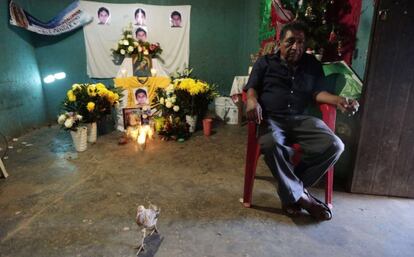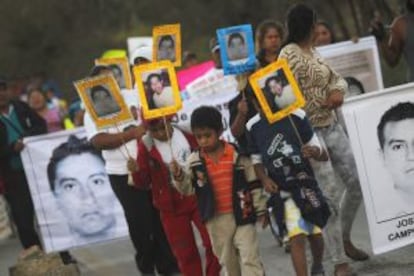Mexico targets drugs and poverty in troubled south
Peña Nieto’s proposed strategy combines combating organized crime with economic aid

Southern Mexico is wounded. In the states of Guerrero, Chiapas and Oaxaca, the country has been left behind. The foreign trade that carried Mexico into the 21st century passed by here without leaving a trace. While states near the US border and in the Bajío region (center-north) have experienced GDP growth of 40 percent in the last two decades, the south’s economy remains firmly mired at Third World levels.
To this misery must often be added the presence of the drug lords in local government. The result is a dangerous mix of poverty and drug trafficking, especially in Guerrero, where 43 trainee teachers were abducted in the town of Iguala in late September, leading to a national crisis that President Enrique Peña Nieta is still struggling to deal with.
To do so, the president’s new agenda combines broad crime-fighting measures and economic development programs in the poorest parts of Mexico.
The model is based on what Italy did in the 1990s in similar circumstances
The first raft of measures includes a mechanism to suspend or dissolve local governments that have been infiltrated by organized crime. The move can only take place at the request of the Attorney’s Office and following approval from the Senate.
The model is based on what Italy did in the 1990s in similar circumstances: a country divided into a prosperous north and a backward, mafia-ridden south. Official sources said the initiative would effectively liquidate dozens of local governments seriously suspected of connivance with the drug rings.
Besides this major initiative, Peña Nieto’s action plan also eliminates Mexico’s local police forces, whose 170,000 officers will be transferred to 32 state agencies believed to be more resilient to corruption. This process, which includes the promise of better wages, will be eight years in the making, and will begin with the ultra-violent states of Guerrero, Jalisco, Michoacán and Tamaulipas.
But some analysts are wary of these sweeping measures. “Be careful about using the hammer when all you need is the surgeon’s scalpel,” says security analyst Alejandro Hope. “Before liquidating a local government, you first need to try all options at your service to stop infiltration, and you certainly need to create very strong locks to prevent abuse. As for eliminating the municipal police, let us not forget that the state agencies are also in need of improvement. They are very small and you need to watch that they don’t fall prey to corruption themselves, as the effect would be bigger than with local police.”
Peña Nieto’s other major initiative is the development plan for southern Mexico, which in the president’s own words suffers from an “age-old backwardness.”
This package will designate three new development hubs eligible for preferential financial conditions: Puerto Chiapas, Puerto Lázaro Cárdenas and the Isthmus of Tehuantepec, an industrial corridor connecting the Pacific with the Gulf of Mexico. There will also be temporary work programs for 300,000 families, direct capital injection in public works projects, and credit lines for small and midsize businesses worth $160 million, with a further $320 million earmarked for agricultural development.
“There is no doubt that this plan can help the region, but it is insufficient,” says the economist Gerardo Esquivel, a teacher and researcher at Colegio de México. “Such a poor area needs an integral development strategy, a massive investment in infrastructure that will change the dynamics of the land.”

The president is also dangling another promise in front of the nation: the possibility of raising the minimum wage, which is currently 65 pesos (around $5) for an eight-hour workday. Raising this figure was originally a demand of Mexico’s political left, especially in the Federal District, and no party has found any convincing arguments against it. Mexico’s minimum wage is not only the lowest among all Organisation for Economic Co-operation and Development (OECD) nations; it has also lost nearly 80 percent of its purchasing power since 1976, according to a study by Mexico’s UNAM university.
In order to open the door to this raise, the government is suggesting severing the ties between the minimum wage and economic indexes. While this will not ensure a raise, experts admit, it does bring some degree of hope to Mexico’s 52 million poor.
“This is a good sign, it reflects some sensitivity on the president’s part, and an acknowledgment of the lowest earners’ precarious situation,” says Esquivel.
Tu suscripción se está usando en otro dispositivo
¿Quieres añadir otro usuario a tu suscripción?
Si continúas leyendo en este dispositivo, no se podrá leer en el otro.
FlechaTu suscripción se está usando en otro dispositivo y solo puedes acceder a EL PAÍS desde un dispositivo a la vez.
Si quieres compartir tu cuenta, cambia tu suscripción a la modalidad Premium, así podrás añadir otro usuario. Cada uno accederá con su propia cuenta de email, lo que os permitirá personalizar vuestra experiencia en EL PAÍS.
En el caso de no saber quién está usando tu cuenta, te recomendamos cambiar tu contraseña aquí.
Si decides continuar compartiendo tu cuenta, este mensaje se mostrará en tu dispositivo y en el de la otra persona que está usando tu cuenta de forma indefinida, afectando a tu experiencia de lectura. Puedes consultar aquí los términos y condiciones de la suscripción digital.









































